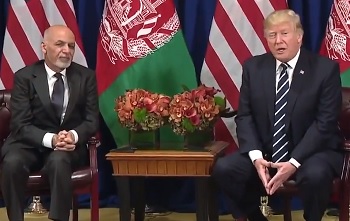Washington’s Man in Kabul Under Siege
 Michael Hughes
Michael Hughes
December 16, 2017
President Ashraf Ghani is taking fire from every direction in Afghanistan for his inability to deliver on key promises including implementing election reforms, filling critical political positions, and making progress on infrastructure development. Up until now, his most consistent support has come from the U.S. and its military but, the question is, will this be enough to sustain his political life.
There are issues like Pakistan’s support for the Taliban that Ghani has little control over but he is committing unforced errors in areas where he can make a substantial difference and the frustration is palpable.
On December 14, Tolo News reported that members of Kabul’s provincial council, for example, have accused the president of “breaking his campaign promises and deceiving the people,” pointing to the fact the capital city is still without a mayor and that he has not expanded authorities in municipalities so local officials can effectively address water and electricity shortages.
For example, despite initiatives to expand the country’s electrical grid, a recent survey by the Asia Foundation found that just 12% of Afghans in 2017 said their electricity supply has improved while 43% say it has gotten worse.
The same poll revealed that only 36% of Afghans have confidence in government ministers, a number of slots of which Ghani has also failed to fill. More than half of the cabinet’s 25 ministry posts had remained vacant for months until earlier in December when parliament approved 11 positions.
Ghani has reacted poorly to challenges and has even exhibited dictatorial tendencies – such as not allowing a rival’s plane to land to join a political opposition gathering, barring employees from participating in protests and launching corruption probes against detractors. Some of Ghani’s critics have even called for a nationwide referendum on his authority.
Afghanistan’s Independent Election Commission (IEC) during the summer announced that parliamentary and district council elections would be held on July 7, 2018, but because of technicalities and the security situation “the 2018 poll date looks to be an impossible milestone” Managing Editor of The Diplomat, Catherine Putz, has argued.
According to the New York Times, many Western diplomats in Kabul are frustrated by Ghani’s lack of progress on elections “with some even beginning to question whether he ever intended to hold them.”
What is notable about the piece is the suggestion that Ghani is essentially a Western puppet, not unlike Karzai – but one wonders if Washington is taking any steps behind the scenes to address the situation.
“For American officials, the pressure mounting on Mr. Ghani has been particularly awkward: Some of their closest Afghan allies over the years, still essential to the military campaign, are rallying against a political leadership in Kabul that is perceived to be protected by the Americans,” Mujib Mashal wrote in the New York Times on December 12.
In normal environments Ghani’s performance would amount to a recipe for a one-term presidency, but he is benefitting from the fact that the political opposition is as fragmented as ever.
In a twisted way, the raging Taliban insurgency actually benefits him as well. Many Afghans are under the belief that the U.S. presence is necessary to prevent a Taliban takeover, and Ghani is obviously in bed with Washington. The president may see U.S. support as his saving grace in a way.
Consider the way Ghani immediately seemed to endorse President Donald Trump’s South Asia strategy. Without even blinking the president gave a thumbs up to a plan that calls for U.S. and Afghan forces intensifying airstrikes and escalating a drug war from the sky that will certainly boost the level of civilian casualties that is already much too high.
According to Pentagon data, the United States is on track to drop more than three times the number of bombs on Afghanistan in 2017 compared to the previous year.
“The number of civilian casualties is today higher than at any time since the 2001 invasion, with the sharpest increase in deaths caused by air strikes and artillery barrages carried out by US and Afghan puppet forces,” the World Socialist Web Site claimed on November 23.
Ghani has warmed up to Trump personally and even gave him a greenlight to exploit Afghanistan’s mineral deposits, inviting an excursion of neocolonial resource imperialism that will only destabilize the country even further.
It boggles the mind that Ghani would simply allow the United States to treat his country as a colony and leave so many of his fellow Afghans so vulnerable. The president knows full well that the Trump administration does not have Afghan interests at heart in the least.
The Taliban love to exploit this perception as well, referring to Ghani as a Western puppet whenever they get a chance. Unfortunately, the Taliban perception might be fairly close to reality. And now it is up to the Americans to protect another Shah Shuja – at least, that is what Ghani seems to be banking on.
